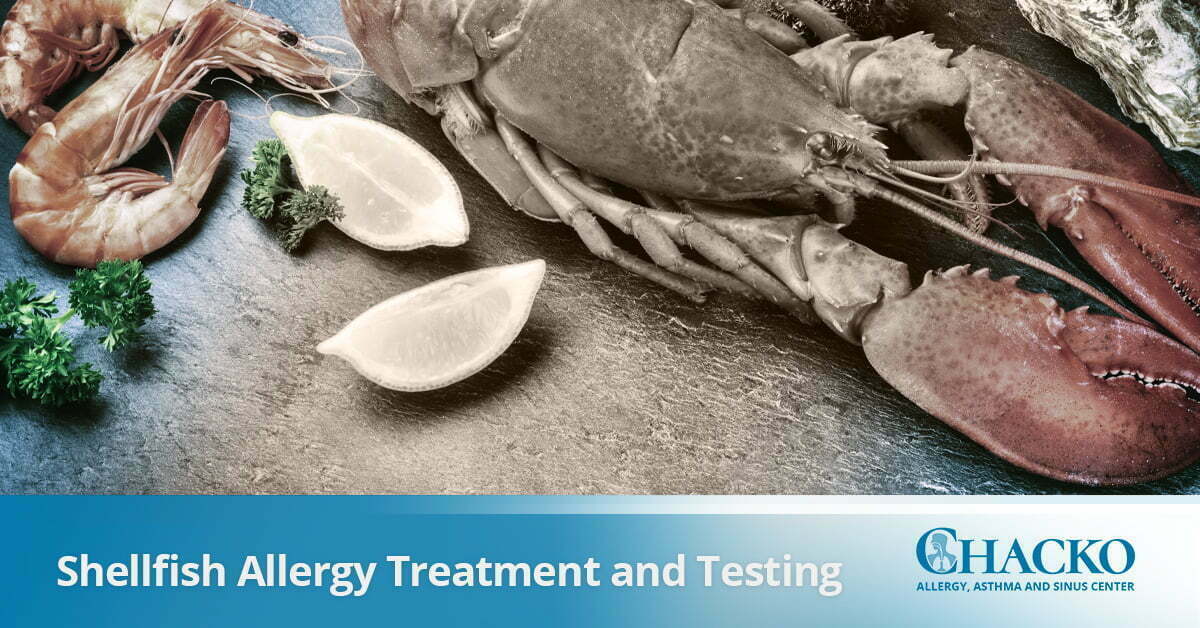Top-Rated Shellfish Allergy Care in Atlanta
At Chacko Allergy, Asthma and Sinus Center, our allergy doctors provide reliable food allergy testing and management for Atlanta adults and children with shellfish allergies. While most food allergies are far more common in children than adults, allergies to shellfish can affect people of any age.
In fact, a shellfish allergy is the most common food allergy for United States adults, and the third most common for children. And with the various types of crustaceans and mollusks carrying the threat of anaphylaxis, it’s crucial that you get the help of an experienced food allergist at the first signs of any symptoms.

A Closer Look at Shellfish Allergies
A shellfish allergy is an immune system overreaction to proteins in crustaceans (crab, crayfish, lobster, prawns, shrimp) and mollusks (clams, mussels, octopus, oyster, scallops, squid). A patient may be allergic to just one type of shellfish or to many. In addition, allergies to crustaceans occur more often than allergies to mollusks. Data indicates that 2.4% of U.S. adults are crustacean-allergic, while 1.6% are mollusk-allergic.
If you notice any of the following signs of a shellfish allergy, you should seek the help of an experienced allergist.
- Raised red bumps on the skin.
- Stomach pains and vomiting or diarrhea.
- A tight chest and breathing difficulties.
- Blocked or runny nose and a cough.
- Itching or tingling lips, tongue or throat.
How We Test for Shellfish Allergies
Shellfish allergy testing is a key aspect of treating allergies and preventing severe reactions. The aim of this test is to discover how a person’s immune system responds to shellfish proteins like tropomyosin. At Chacko Allergy, Asthma and Sinus Center we use several tests to help diagnose an allergy.
- Skin Prick Testing – A small amount of shellfish allergen is applied to the skin’s surface, then the area is pricked to allow the substance to enter the outer layer.
- Blood Testing – A blood sample is sent for laboratory testing to measure the level of shellfish IgE antibodies in the blood.
- Oral Food Challenge – A patient consumes increasing amounts of shellfish under medical supervision to monitor for any allergic reactions.
Skin prick testing is the most common procedure for diagnosing food allergies. However, when skin conditions or medications interfere with testing, alternative methods like blood tests or oral food challenges can provide accurate results.
Top Shellfish Allergy Management Methods
There are various treatment options for a shellfish allergy. Our allergy doctors will recommend a treatment based on the severity of the allergy and your individual situation.
Epinephrine auto-injector – Carrying an epinephrine auto-injector is essential for dealing with anaphylaxis. During a consultation, patients will be shown how and when to use this injectable solution.
Antihistamines and corticosteroids – These medications may offer some benefits to individuals with mild symptoms.
Tips for Safe Dining With a Shellfish Allergy
Managing a shellfish allergy doesn’t have to limit your social life or cause anxiety about dining out. With the right precautions you can enjoy meals confidently and safely. Before choosing a restaurant, review their website for policies and allergy information. Menus should detail allergens to help you make informed choices. If in doubt, opt for simple dishes that are less likely to contain shellfish in sauces.
Even small traces of shellfish could cause a reaction. To avoid cross-contamination, ask your server the following questions.
- Do you use separate cooking equipment and utensils for shellfish-free meals?
- Is the fryer or grill used for shellfish also used for other foods?
- Can my meal be prepared in a clean area away from shellfish?
- Are there any sauces or seasonings that contain shellfish ingredients?
With this simple plan and clear communication, you can enjoy dining out while minimizing the risk of cross-contamination with shellfish.
Common Questions About Shellfish Allergies
Is a shellfish allergy and a fish allergy the same?
While fish and shellfish are classified as seafood, they are biologically distinct. However, it is certainly possible to be allergic to multiple types of seafood – including those from both the fish and shellfish categories.
Do I have a shellfish allergy or a shellfish intolerance?
To determine whether you have an allergy or intolerance, your allergist will need to discuss symptoms and possibly conduct allergy testing. An intolerance can be uncomfortable, but is less dangerous than an allergy.
How is a shellfish allergy diagnosed?
A shellfish allergy is diagnosed using food allergy testing. Your allergist will ask about your medical history and symptoms before testing your response to various allergens. Types of testing include skin prick tests, blood tests and the oral food challenge test.
Reliable Management of Shellfish Allergies in Atlanta
At the Chacko Allergy, Asthma and Sinus Center, we help adults and children with shellfish allergies. Our allergy doctors provide effective shellfish allergy testing and management plans from our locations in the Atlanta area. For assistance, call (678) 668-4688 or request an appointment today.
